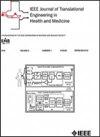Effects of Home-Based Computerized Cognitive Training in Community-Dwelling Adults With Mild Cognitive Impairment
IF 3.7
3区 医学
Q2 ENGINEERING, BIOMEDICAL
IEEE Journal of Translational Engineering in Health and Medicine-Jtehm
Pub Date : 2023-09-19
DOI:10.1109/JTEHM.2023.3317189
引用次数: 0
Abstract
Objective: There is a growing importance for the home-based (HB) support services, and computerized cognitive training (CCT) has been reported as an effective intervention for cognitive impairment. However, there is still a need for further verification of the effect of HB-CCT. This study aimed to determine the effectiveness of HB-CCT on the cognitive function of community-dwelling adults with mild cognitive impairment (MCI) as well as safety in its use. Methods: Fifty community-dwelling adults with MCI were included, of which 25 each were randomized to either HB-CCT or control groups. Evaluations of comprehensive cognition, memory, attention, language, executive function, and depression were performed before and after the intervention, including three times a week for eight weeks in the intervention group and eight weeks apart with no intervention in the control group. Results: In baseline and post-evaluation comparisons, the HB-CCT group showed significant improvements, while the control group did not show significant changes. Statistically significant variations were noted between the HB-CCT and control groups in all post-intervention evaluations relative to baseline. Additionally, no side effects were observed. Conclusion: Beneficial effects on cognition and depression were noted in the intervention group compared with the control group, suggesting that HB-CCT may be a positive tool for cognitive improvement in adults with MCI.以家庭为基础的计算机认知训练对社区居住的轻度认知障碍成人的影响
目的:基于家庭(HB)的支持服务越来越重要,计算机化认知训练(CCT)已被报道为一种有效的认知障碍干预措施。但是,HB-CCT的效果还需要进一步验证。本研究旨在确定HB-CCT对社区居住成人轻度认知障碍(MCI)认知功能的有效性及其使用安全性。方法:纳入50名社区居住的MCI成人,其中25名随机分为HB-CCT组和对照组。在干预前后分别进行综合认知、记忆、注意力、语言、执行功能和抑郁的评估,干预组每周三次,持续8周,对照组间隔8周不进行干预。结果:在基线和评价后比较中,HB-CCT组表现出显著的改善,而对照组没有表现出显著的变化。与基线相比,在所有干预后评估中,HB-CCT和对照组之间的差异具有统计学意义。此外,没有观察到副作用。结论:与对照组相比,干预组在认知和抑郁方面的效果显著,表明HB-CCT可能是一种改善成人轻度认知障碍患者认知的积极工具。
本文章由计算机程序翻译,如有差异,请以英文原文为准。
求助全文
约1分钟内获得全文
求助全文
来源期刊

IEEE Journal of Translational Engineering in Health and Medicine-Jtehm
Engineering-Biomedical Engineering
CiteScore
7.40
自引率
2.90%
发文量
65
审稿时长
27 weeks
期刊介绍:
The IEEE Journal of Translational Engineering in Health and Medicine is an open access product that bridges the engineering and clinical worlds, focusing on detailed descriptions of advanced technical solutions to a clinical need along with clinical results and healthcare relevance. The journal provides a platform for state-of-the-art technology directions in the interdisciplinary field of biomedical engineering, embracing engineering, life sciences and medicine. A unique aspect of the journal is its ability to foster a collaboration between physicians and engineers for presenting broad and compelling real world technological and engineering solutions that can be implemented in the interest of improving quality of patient care and treatment outcomes, thereby reducing costs and improving efficiency. The journal provides an active forum for clinical research and relevant state-of the-art technology for members of all the IEEE societies that have an interest in biomedical engineering as well as reaching out directly to physicians and the medical community through the American Medical Association (AMA) and other clinical societies. The scope of the journal includes, but is not limited, to topics on: Medical devices, healthcare delivery systems, global healthcare initiatives, and ICT based services; Technological relevance to healthcare cost reduction; Technology affecting healthcare management, decision-making, and policy; Advanced technical work that is applied to solving specific clinical needs.
 求助内容:
求助内容: 应助结果提醒方式:
应助结果提醒方式:


